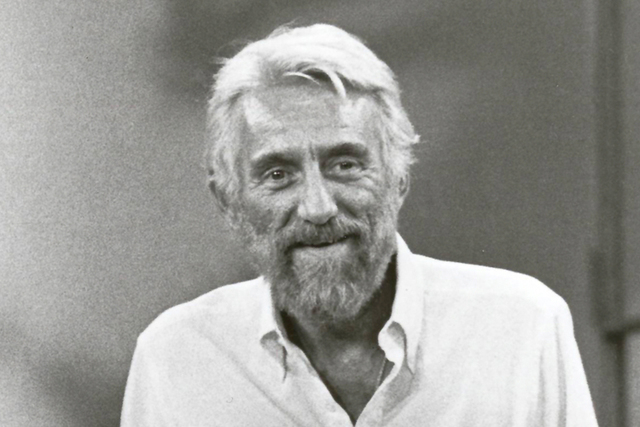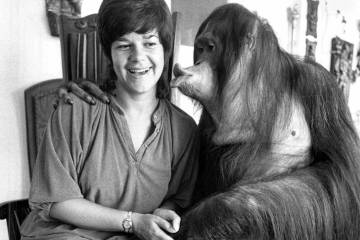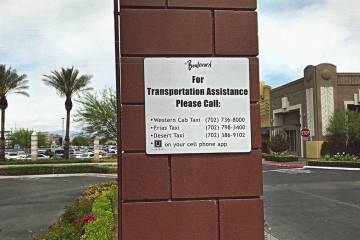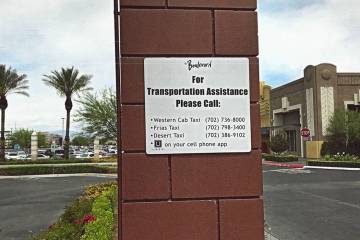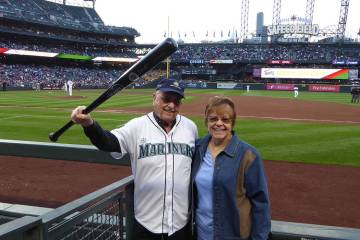Poet McKuen’s early days trace to Nevada
The death of poet, songwriter and singer Rod McKuen at 81 on Jan. 29 was worldwide news, but because he lived in so many places, his Nevada days didn’t get prominent mention in his obituaries.
But Nevada played a role in his early days, days when he was beaten and abused, days when he was a truant, days when he was in reform school, days when as a young man he worked various jobs in the West.
In McKuen’s own writings, he mentioned living as a child in North Las Vegas, going to reform school in Elko and spending time in Ely, Caliente, Winnemucca and Alamo. And hating the cold.
Turns out he learned his first cuss word in Winnemucca, where he had a crush on a girl named Jane.
“I learned my first four-letter word from fellow hitchhikers in Winnemucca, Nevada. The second one I learned was ‘love ’ because I needed it,” McKuen wrote.
On his website, www.rodmckuen.com, McKuen wrote about his past and answered fan questions.
In 2009, he wrote, “I first met Bing Crosby in Elko, Nevada, when I was a kid. I was incarcerated at The Nevada School of Industry as a chronic runaway and truant. Some of us in this ‘reform school’ were assigned to work details on nearby ranches for a dollar a day in commissary money. One I did chores on several times was Crosby’s: I was about 12 at the time, and nearly three decades later I was reunited with Bing in San Francisco.”
Some critics dissed his work. His obituary in The New York Times sneered his work “met with immense commercial success if little critical esteem.”
The Times continued: “Ranging over themes of love and loss, the natural world and spirituality, his work was prized by readers for its gentle accessibility while being condemned by many critics as facile, tepid and aphoristic.”
Remember the songs “If You Go Away” and “Seasons in the Sun”? He wrote them after he had moved to Paris in the 1960s and was influenced by French composer Jacques Brel. “Love’s Been Good To Me” might ring a bell.
Perusing some of his works on his website showed several Nevada-specific mentions, not necessarily happy ones. He was abused by his stepfather and constantly running away. The family’s frequent moves were because of his stepfather, who helped build roads, abused McKuen and was an alcoholic. His mother, a barmaid, was so beautiful that the family could hitch rides when they were carless.
McKuen, who died in Beverly Hills, Calif., wrote of playing in the yard in North Las Vegas when the Japanese bombed Pearl Harbor. His mother often worked the night shift as a barmaid, and he and his brother Billy’s favorite place to play was the city dump. One Christmas, she worked a double shift, so he and Billy decided to redecorate their home with their findings from the dump. At a spontaneous yard sale, the brothers sold the furnishings inside the house, raising $71.30. When his mother sat down on the rescued davenport, it collapsed.
His early days in Alamo nabbed a mention in “Lonesome Cities,” which won him a spoken-word Grammy Award.
Another Lonesome City was Paris, where “roaches lined up in cinema seats along the bathtub, arriving so frequently I almost gave them each a name.”
A high school sophomore who had just discovered McKuen’s work in 2002 asked about the circumstances surrounding “Alamo Junction,” written in 1969 and included in his book “Someone’s Shadow.”
McKuen replied, “When I was around 6 or 7, I moved with my family to a little town in rural Nevada called Alamo. It was little more than a railroad junction and hence the name. I can’t say I was a very happy kid in Alamo and the lyric, though a work of fiction, probably mirrors the memory I have of a somewhat less than perfect childhood.”
ALAMO JUNCTION
When I get back to ALAMO JUNCTION
I guess they’ll all be pretty surprised
to find out just how tall I’ve grown
and oh how worldly wise.
When I go home to ALAMO JUNCTION
I’ll look those people straight in the eyes
the ones who thought I’d never go nowhere
and never come home with the prize.
I’ll tell them all what kind of world
lies beyond the trees.
I’ll tell them all of the times I’ve had
while hiking the highway and sailing the seas.
When I go home to ALAMO JUNCTION
they’ll all turn out decked out in their best,
they’ll welcome me their soldier of fortune
who’s set apart from the rest.
When I got back to ALAMO JUNCTION
the town somehow just wasn’t the same,
all the folks I thought would remember
had all but forgotten my name.
On the remote chance that former Sheriff Ralph Lamb, although half a dozen years older, might have known McKuen in Alamo, I called.
Lamb couldn’t recall the McKuen name, just as the poet foretold.
But McKuen’s description of himself as Alamo’s “soldier of fortune who’s set apart from the rest,” rings true. Certainly for his fans.
Jane Ann Morrison’s column appears Thursdays. Email her at jmorrison@reviewjournal.com or leave a message at 702-383-0275. Find her on Twitter @janeannmorrison.



